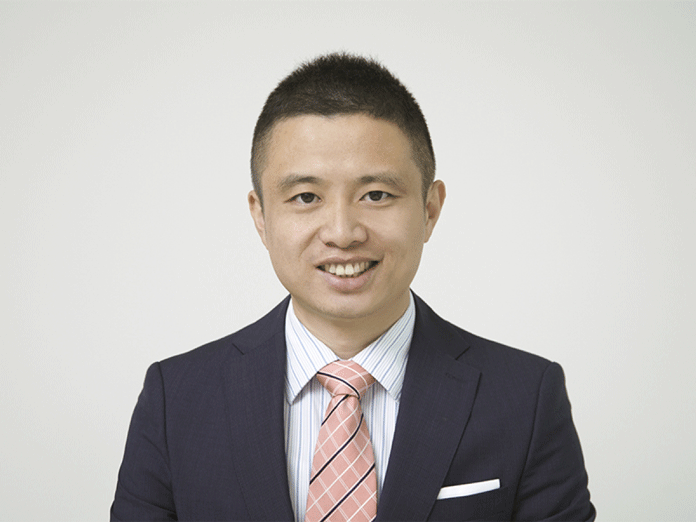 Michael Tan has worked in the legal industry for more than 16 years, following his graduation from the University of International Business and Economics in Beijing. He has been an extremely active and supportive member of the European Chamber since it was first established in 2000, when he began to get involved in activities organised by the Chamber’s Intellectual Property Rights Working Group. He has also been a regular contributor of articles to EURObiz.
Michael Tan has worked in the legal industry for more than 16 years, following his graduation from the University of International Business and Economics in Beijing. He has been an extremely active and supportive member of the European Chamber since it was first established in 2000, when he began to get involved in activities organised by the Chamber’s Intellectual Property Rights Working Group. He has also been a regular contributor of articles to EURObiz.
Michael served as Vice Chair of the Legal and Competition Working Group in 2015/2016, and made great contributions to the group in terms of his commitment and the quality content that he brought. He is currently a partner at Taylor Wessing in Shanghai, specialising in corporate M&A, technology, media and telecoms (TMT), data protection, aerospace and aviation.
What made you decide to step up your involvement and run for the position of vice chair?
It was down to my willingness to contribute personal efforts and time, in particular my connections with the local Chinese circle (e.g. institutions and agencies). It was also driven by my desire to be more involved in Chamber activities.
Did you find the role fulfilling?
I found it quite meaningful as it gave me the chance to better understand the concerns of both the members and the Chamber, and to contribute our efforts and resources. On the other hand, it was also quite challenging to manage my own capacity so that I was able to actually make worthwhile contributions to the Chamber’s initiatives, as opposed to just holding the title.
What are the main market access issues that foreign law firms face in China? Have you noticed any developments over the years in this respect?
There are still regulatory restrictions in place as regards what foreign law firms can do in this market, which puts them in a disadvantageous position compared with their Chinese peers. These restrictions include a prohibition on practising PRC law through the employment of qualified and licensed Chinese lawyers, and on representing clients before Chinese courts and government authorities. We have observed that these restrictions have remained there for a very long time. Recent trends, such as the latest revision of the Foreign Investment Industrial Guidance Catalogue in 2015, show a tendency towards even tighter controls in this respect nationwide, although certain liberalisation has also been witnessed in some pilot areas like the free trade zones in Shanghai and Guangdong.
According to the Chamber’s Business Confidence Survey 2015, 90 per cent of legal firms in China would be more likely to increase investment if the market opens further. Do you think it’s still the case right now with the slowdown that China’s economy is undergoing?
I think it is still the case. The slowing down of the economy may well negatively impact new-entry business, but it could also bring new business for foreign law firms, for example, in the area of business restructuring, as we have seen in the past.
Did the China (Shanghai) Pilot Free Trade Zone open up the legal industry to foreign law firms in any concrete way?
Yes and no. New policies rolled out in the pilot zone have brought some liberalisation—for example joint venture operation is now permissible there—but the extent of liberalisation and business access is still quite limited. The fact that most foreign law firms are still in ‘wait and see’ mode to some extent reflects this.
Rule of law was the central theme of the Fourth Plenum: has rule of law in China improved since then?
In general yes. This can be seen from many aspects, including the crackdown on corruption and bureaucracy, reform of the judicial system, a streamlining of administrative procedures and the establishment of a credit-based system associated with law enforcement.
What would you consider to be the major lobbying successes of the working group?
I think the working group has been constantly stressing the general topic of transparency and we have seen gradual improvements in this area, though of course this is not necessarily driven by the working group’s efforts alone. Specifically talking about the legal service sector, I see very little improvement has been made, which is likely due to the special nature of the legal service sector; this has been reflected by the fact that many key recommendations under the respective European Chamber position paper have remained the same for many years. In my personal view, this is a highly sensitive sector and any real breakthrough will very much depend on bilateral negotiations between the EU and China on a reciprocal basis.
What do you feel are the main differences in China’s legal industry now, compared to when you first started practicing law in China?
Chinese firms are growing quickly, to some extent benefiting from the regulatory restrictions against foreign law firms. The market is becoming more and more competitive, but also the client base is growing with more and more Chinese clients conducting China outbound business.
Do you have any suggestions for topics/issues you would like the Legal and Competition Working Group to cover this year?
I personally would like to see more working-level exchanges between the foreign law firm circle and the Chinese law firm circle, on a basis that is genuinely mutually beneficial, not just symbolic. Also I would expect the Legal and Competition Working Group to relay member concerns back to the European Delegation—as is being done—so as to add more weight to the topic of market access during bilateral negotiations.


Recent Comments